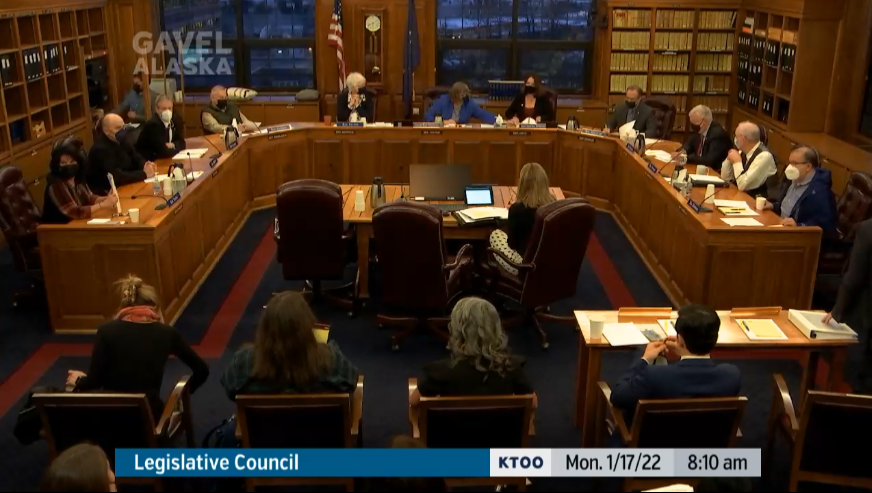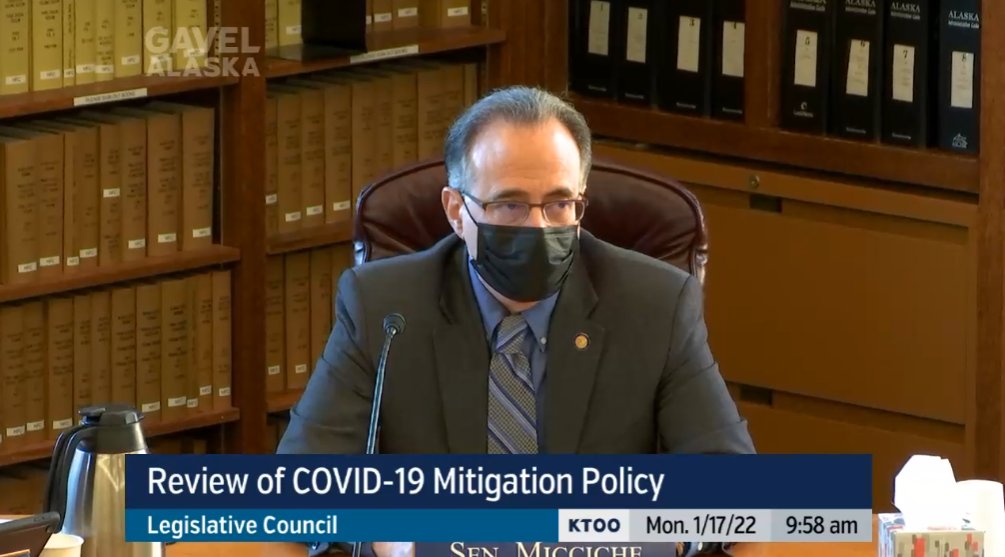
The Legislative Council is meeting this morning. This is the make-up meeting continuing last Thursday's hearing. On the agenda is an executive session about the scholarship lawsuit and then possible updates to the building's covid-19 policy.
w3.akleg.gov/includes/_play…
#akleg
w3.akleg.gov/includes/_play…
#akleg

This afternoon at 2 p.m. will be the day's key hearing when the Legislative Budget and Audit Committee is set to hold its hearing on the firing of Alaska Permanent Fund Corporation's executive director Angela Rodell... which is also set to start with an executive session.
#akleg
#akleg
And the Legislative Council is now in executive session. Per the agenda, they're considering whether the #akleg should join the UA students' lawsuit challenging Gov. Dunleavy's decision to sweep the Higher Education Investment Fund. That suit has oral arguments in Feb. 8.
Not sure how long it'll be, but it'll probably be long enough to listen to @AndrewHalcro's latest edition of With All Due Respect, which covers the latest turn in the Rodell firing.
https://twitter.com/AndrewHalcro/status/1483124742190026754
The Legislative Council is back from its executive session on the Higher Education Investment Fund lawsuit.
The sun's up in Juneau now.
#akleg
The sun's up in Juneau now.
#akleg

Out of the executive session, the Legislative Council is now taking up a motion to file an amicus brief on the Higher Education Investment Fund lawsuit, which affects funding of scholarships and WAAMI.
Sens. Stevens and Stedman both speak in support of it.
Sens. Stevens and Stedman both speak in support of it.
Sen. Stedman notes that the sweep of the Higher Education Investment Fund happened because the Dunleavy administration reinterpreted the rules AFTER legislation to liquidate the fund failed in the #akleg.
The motion for the #akleg to file an amicus brief on the Higher Education Investment Fund lawsuit passes 12-1.
The lone nay is Rep. Cathy Tilton.
Even Reinbold voted in favor of it.
The lone nay is Rep. Cathy Tilton.
Even Reinbold voted in favor of it.
Now onto the #akleg covid-19 mitigation policy. Rep. Hannan notes they have to run things back from last hearing, which was recessed, because the last hearing ran out.
They're in a bit of a time crunch with this hearing, too.
Sen. Reinbold makes a motion to make masking optional. They had got pretty far into debate last Thursday before technical issues sidelined the hearing.
Seems like chair Rep. Hannan is looking for a vote.
Sen. Reinbold makes a motion to make masking optional. They had got pretty far into debate last Thursday before technical issues sidelined the hearing.
Seems like chair Rep. Hannan is looking for a vote.
Sen. Stevens, R-Kodiak, says with Omicron and Alaska's tendency to lag behind the nation's surges: "It seems like absolutely the wrong time to do this. ... Maybe later, if things change, but not now."
Would this affect just #akleg legislators and staff? Or would it also be optional for the public?
Reinbold says it's her intention for it to be legislators and staff (so not the public?) and says everyone's either been fully vaccinated or had covid-19 anyways.
Reinbold says it's her intention for it to be legislators and staff (so not the public?) and says everyone's either been fully vaccinated or had covid-19 anyways.
Sen. Stedman also agrees that it's premature to really roll back masks. He says they're gonna be here for 121 days—"maybe a few days shorter"—and they can revisit the policy at any time.
Rep. Tuck, who's generally been against masks, says he doesn't like the masks but likes having the public in the capitol. Says some mitigation is warranted: "What is going to happen to our session if we ended up with such an outbreak?"
#akleg
#akleg
Tuck says he'll support a mask mandate because he wants to keep both the Legislature operating and open to the public.
Rep. Claman notes that some legislators may be fine taking a risk without wearing masks but says its "part of our job as legislators to protect the public."
#akleg
#akleg
Rep. Tilton seems to claim that making masking optional is actually improve access to the public.
Then she says some things that would probably get me suspended for repeating but it basically boils down to "I don't trust the science and freedom is the answer."
Then she says some things that would probably get me suspended for repeating but it basically boils down to "I don't trust the science and freedom is the answer."
And Sen. Reinbold's optional masking amendment to the #akleg covid-19 mitigation policy fails. 10N-3Y.
No votes are Tilton, Reinbold and Micciche.
No votes are Tilton, Reinbold and Micciche.

Senate President Micciche makes a motion to make regular testing optional.
Rep. Tuck talks about his experience testing positive and says that everyone in the #akleg ought to trust each other. Says he supports making regular testing optional because they have masks anyways.
Rep. Tuck talks about his experience testing positive and says that everyone in the #akleg ought to trust each other. Says he supports making regular testing optional because they have masks anyways.
Sen. Stedman opposes repealing the testing mandate. He says the current situation doesn't warrant rolling back protections: "Sometimes you just have to put your big-boy pants on and deal with these issues."
#akleg
#akleg
Sen. Hoffman: "For us to let our guard down is quite foolish to me. We need to be protective of the health of the people in this building."
Says the testing requirements need to stay in place until the cases come down.
#akleg
Says the testing requirements need to stay in place until the cases come down.
#akleg
Sen. Stevens notes the #akleg has no ability to vote remotely (because the House Republicans have refused to support a change) and worries that session will run off the rails with an outbreak.
And Sen. Reinbold says some stuff that I will not repeat but will say that she at least has some citations this time that don't include a ".info" domain.
"All of this is theat-re."
"All of this is theat-re."
Sen. Stedman basically says let's vote: "No one expects Sen. Reinbold to do the testing. I expect her to exercise her constitutional rights and enter the building anyway she wants. If she has the votes, vote."
#akleg
#akleg
Sen. Reinbold wants to make a point of order: "The testing and the medical..."
And motions at Senate President Micciche.
Micciche:
And motions at Senate President Micciche.
Micciche:

The optional testing motion fails. 9N-4Y.
YES: Tuck, Tilton, Micciche, Reinbold
NO: Claman, Edgmon, Foster, Stutes, Bishop, Hoffman, Stedman, Stevens, Hannan
Before they wrap up, they're extending the testing/screening contract.
YES: Tuck, Tilton, Micciche, Reinbold
NO: Claman, Edgmon, Foster, Stutes, Bishop, Hoffman, Stedman, Stevens, Hannan
Before they wrap up, they're extending the testing/screening contract.
• • •
Missing some Tweet in this thread? You can try to
force a refresh








